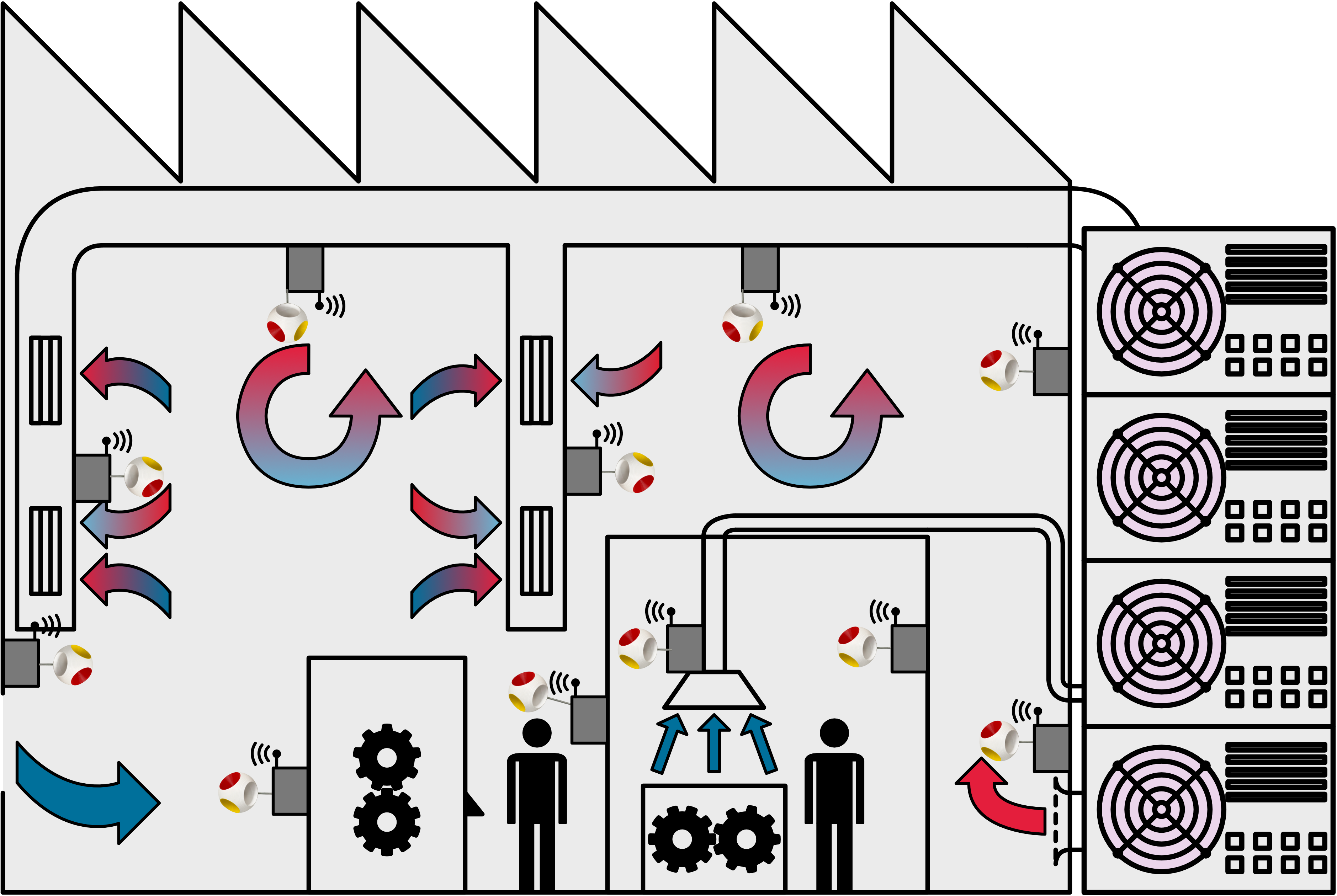
Die Umgebungsbedingungen in Produktionshallen von Industriebetrieben bestimmen nicht nur die Prozess- und Produktqualität, sondern auch die Arbeitssicherheit und Arbeitsbedingungen der Mitarbeiter. Die kontinuierliche Sicherstellung dieser Umgebungsbedingungen durch raumlufttechnische (RLT) Anlagen steht im Zielkonflikt mit deren Energiebedarf, der einen erheblichen Anteil am Energiebedarf der Industrie in Deutschland ausmacht. In der Praxis werden raumlufttechnische Anlagen basierend auf Normen, technische Regeln und Erfahrungswerten – meistens überdimensioniert - ausgelegt und durch nicht ausreichende Kenntnis des Systemzustandes auch ineffizient betrieben.
Das Projekt 3DEMO zielt nun zum einen auf die Entwicklung innovativer Dienstleistungskonzepte auf Basis eines 3D Emission Monitoring in Fabrikhallen ab, zum anderen steht die Entwicklung des hierfür nötigen cyberphysischen Systems und der nötigen technologischen Bausteine im Fokus. Ein technologischer Baustein ist das Netzwerk aus drahtlosen Sensorknoten in Verbindung mit Gebäudesimulation, die dynamisch die gewünschten Raumluftparameter erfassen. Als ein weiterer technologischer Baustein, stellen innovative Visualisierungskonzepte die Informationen kontext- und zielgruppenbezogen Mitarbeitern in verständlicher Form zur Verfügung. Diese zeitliche und örtlich hohe Transparenz der Umgebungsbedingungen, welche durch das cyberphysische System geschaffen wird, in Verbindung mit dem gegebenen Einsparpotenzialen und Nutzenvorteilen bietet zahlreiche Anknüpfungspunkte für innovative Dienstleistungskonzepte zur Unterstützung von Planung und Betrieb der Produktion bzw. raumlufttechnischen Anlagen (RLT). Vorgesehen sind hier u.a. Planungs- und Beratungsdienstleistungen, aber auch innovative Teleservice und Betreiber/Contracting-Modelle. Die notwendigen technologischen Bausteine (Sensorknoten, Modellierung/Simulation, Visualisierung) sind zwar grundsätzlich vorhanden, aber werden im geplanten Vorhaben entsprechend des Gesamtkonzepts adaptiert und zu einem innovativen, cyberphysischen System umgesetzt. Die Anwendbarkeit und Übertragbarkeit in verschiedene Branchen und Unternehmensgrößen/-strukturen wird durch die Zusammensetzung der Anwendungspartner sichergestellt.
Förderung: Bundesministerium für Wirtschaft und Energie (BMWi)
Laufzeit: 01.04.2019 bis 31.03.2022
| Name | Telefon | Raum | |
|---|---|---|---|
| Prof. Dr. Felix Büsching | f.buesching[[at]]ostfalia.de | +49 531 3913289 | 111 |
| Jan Schlichter | schlichter[[at]]ibr.cs.tu-bs.de | +49 531 3913154 | 118 |
| Dr. Yannic Schröder | schroeder[[at]]ibr.cs.tu-bs.de | ||
| Prof. Dr.-Ing. Lars Wolf | wolf[[at]]ibr.cs.tu-bs.de | +49 531 3913288 | 138 |
| Titel | Art | Betreuer | Status |
|---|---|---|---|
| Sensorknotenentwicklung | HiWi Job | Jan Schlichter | offen |
| Entwicklung eines Sensorarrays für anemometrische Messungen, ... | Bachelorarbeit | Prof. Dr. Felix Büsching | abgeschlossen ~2019 |
| Development and Evaluation of a 3D air flow sensor | Bachelorarbeit | Jan Schlichter | abgeschlossen 2020 |
| Implementing BPbisv7 for RIOT OS | Bachelorarbeit | Jan Schlichter | abgeschlossen 2020 |
| Implementation and Evaluation of IEEE-802.15.4 Beacon-Enabled Mode for RIOT | Masterarbeit | Jan Schlichter | abgeschlossen 2022 |
| Evaluating the suitability of NS3 for industrial WSNs | Bachelorarbeit | Jan Schlichter | abgeschlossen 2021 |
| Dynamische Anpassung der Abtastrate durch Sensorverknüpfung in WSNs, ... | Masterarbeit | Jan Schlichter | abgeschlossen 2020 |
| Development of a 3D airflow visualization program | Projektarbeit | Jan Schlichter | abgeschlossen 2021 |
| Dynamic Sample Rate Adaptation through Machine Learning in Multisensor WSNs | Masterarbeit | Jan Schlichter | abgeschlossen 2022 |
| Evaluating Different Approaches for IPv6-Gateways in WSNs | Bachelorarbeit | Jan Schlichter | abgeschlossen 2022 |
| Development and Evaluation of Multi-Connectivity in RIOT | Bachelorarbeit | Jan Schlichter, Dr.-Ing. Sven Pullwitt | abgeschlossen 2022 |
Bei Interesse an einer Studien-, Diplom-, Bachelor-, Master- oder sonstiger Arbeit im Bereich dieses Projekts bitte einfach Jan Schlichter oder Prof. Dr. Felix Büsching kontakieren.
Technische Universität Braunschweig
Universitätsplatz 2
38106 Braunschweig
Postfach: 38092 Braunschweig
Telefon: +49 (0) 531 391-0